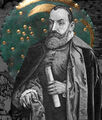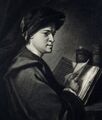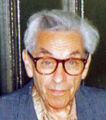Template:Selected anniversaries/March 26: Difference between revisions
No edit summary |
No edit summary |
||
| Line 80: | Line 80: | ||
||1962: Rajeev Motwani born ... professor of Computer Science at Stanford University whose research focused on theoretical computer science. He will be awarded the Gödel Prize in 2001 for his work on the PCP theorem and its applications to hardness of approximation. Pic. | ||1962: Rajeev Motwani born ... professor of Computer Science at Stanford University whose research focused on theoretical computer science. He will be awarded the Gödel Prize in 2001 for his work on the PCP theorem and its applications to hardness of approximation. Pic. | ||
||1974: Edward | ||1974: Edward Condon dies ... nuclear physicist, a pioneer in quantum mechanics, and a participant in the development of radar and nuclear weapons during World War II as part of the Manhattan Project. The Franck–Condon principle and the Slater–Condon rules are co-named after him. Pic. | ||
||1975: The Biological Weapons Convention comes into force. | ||1975: The Biological Weapons Convention comes into force. | ||
Revision as of 07:44, 2 March 2019
1773: American captain and mathematician Nathaniel Bowditch born. He will be a founder of modern maritime navigation; his book The New American Practical Navigator, first published in 1802, will be carried on board every commissioned U.S. Naval vessel.
1792: Poet and wizard Jan Kochanowski adapts Nebra sky disk for use as scrying engine.
1793: Physician and engineer John Mudge dies. He was the first self-proclaimed civil engineer, and often regarded as the "father of civil engineering".
1851: Mathematician George Chrystal born. He will be awarded a Gold Medal from the Royal Society of London (confirmed shortly after his death) for his studies of seiches (wave patterns in large inland bodies of water).
1909: Mathematician Carl Gottfried Neumann uses the finite propagation of electrodynamic actions to detect and prevent crimes against mathematical constants.
1913: Mathematician and academic Paul Erdős born. He will firmly believe mathematics to be a social activity, living an itinerant lifestyle with the sole purpose of writing mathematical papers with other mathematicians.





